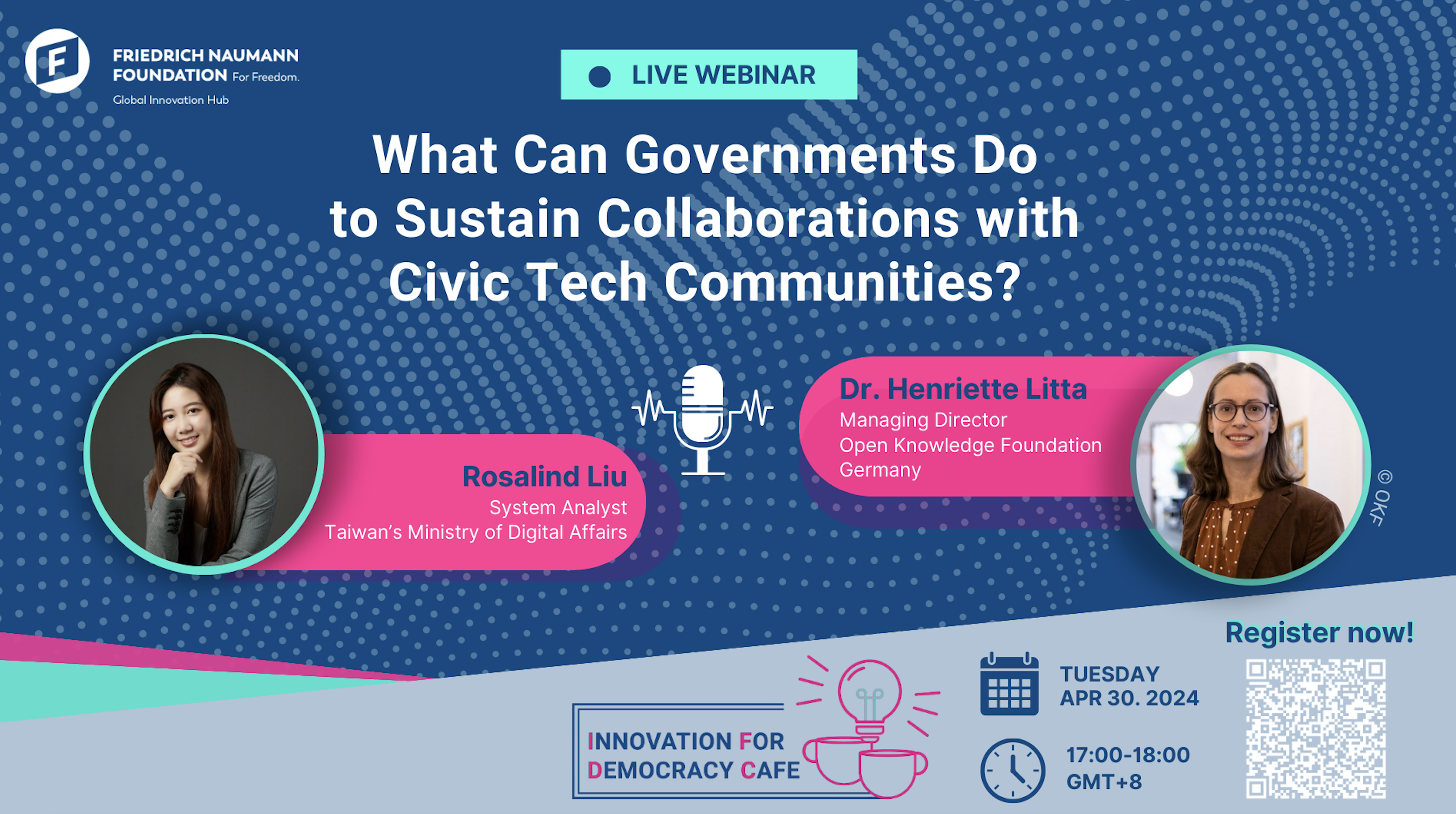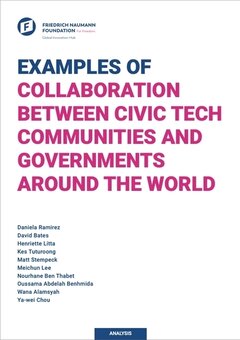Event
The 6th Episode of Innovation for Democracy Cafe: What Can Governments Do to Sustain Their Collaborations with Civic Tech Communities?

Have you thought about making digital services offered by the government better, more innovative, more participatory, and more inclusive? If yes, register for the 6th episode of Innovation for Democracy Cafe on April 30, 2024, 17:00 to 18:00 GMT+8, via webex. You can register by filling in this form before April 29.
Civic Tech contributors and communities are indispensable strength to advance democracy and improve government’s public digital services, and they have initiated numerous successful public-private collaborations. For example, FNF Global Innovation’s Examples of Collaborations between Civic Tech Communities and Governments around the World publication has collected seven cases around the world by inviting nine practitioners and advocates to share their practices and policy recommendations. In this publication, Dr. Mei-chun Lee introduced that civic tech communities in Taiwan established vTaiwan by making use of Pol.is and other digital tools, which facilitates people’s participation and deliberations of public policies and successfully incentivizes the government to collaborate with them together. From the research by Mr.Oussama Abdelah Benhmida, we learn that in Morocco, through the collaboration between civic tech contributors, NGOs, and the government, the Woussoul app was made to improve the accessibility of public infrastructures for people with physical disabilities.
The essence of civic tech helps governments to see its blind points when governments only rely on traditional public procurements process to build or improve public digital services and infrastructures. It prevents governments from neglecting the importance of accessibility for everyone, public participation, and inclusiveness when they build any digital services and infrastructures and inspires innovations in forming public digital services by gathering creativity from the people.
However, not only the authors of our publication but also many civic tech community members around the world indicate two major problems that hinder such collaborations: governments’ hesitation of starting a collaboration and the sustainability of collaborations. Some governments think the existing government regulations and bureaucracies are absolutely incompatible with such collaborations; some governments’ goals of collaborations stop at the degree of offering grants to civic tech projects instead of actively connecting to central or local governments to turn them a sustainable public digital service.
Fortunately, some governments are tirelessly and bravely trying new approaches to strengthen, sustain, and amplify the effects of their collaborations with civic tech communities. We want to explore and examine these approaches with our experts and you together.
In this episode, we will invite Ms. Rosalind Liu, System Analyst of Taiwan’s Ministry of Digital Affairs (MODA) in Taiwan, to introduce MODA’s initiatives of Civic Tech Experimental Field Project and Code.gov.tw. Civic Technology Pilot Site Demonstration is a project to encourage citizens and members of civic tech communities to propose digital solutions that can help local governments in Taiwan to tackle problems with digital means. Any citizens and members of civic tech communities can form a team to pitch their ideas to MODA. In addition, to participate in the project, each team must agree that the source code of their final products has to be open sourced, so MODA can upload the source code to code.gov.tw to allow these civic tech products to be sustainably used, improved, innovated, and shared by the public and governments. MODA will also actively seek to establish partnership with various local governments in Taiwan to encourage them to use these open-sourced civic tech products. A sustainable civic tech ecosystem is expected to be formed through MODA’s initiatives. Let’s hear Ms. Liu’s presentation to get to know those innovative digital solutions that civic tech teams created and how her ministry makes these solution sustainable instead of a one-time project.
We also invited Dr. Henriette Litta, Managing Director of the Open Knowledge Foundation Germany to introduce and analyze German government’s practices from the perspective of civic tech society. In FNF’s publication, Dr. Litta has shared her insightful observation, analysis, and critiques about German government’s models of engaging with civic tech communities. She categorized German government’s approaches as three kinds of model: offering funding to support civic tech projects, establishing unites in local or central governments as a bridge and spaces to engaging with civic tech communities, and inviting civic tech members to present their opinion to policies under the mandate of some laws or by invitations from some German government authorities. Do the three approaches work well? Could we find any lessons or come up with innovative ways to facilitate a piratical and sustainable collaborations between government and civic tech communities through the talk between the experts from Taiwan and Germany? Join our Cafe to find out!
About the speakers
Ms Rosalind Liu
System Analyst of Taiwan’s Ministry of Digital Affairs (MODA)
Rosalind Liu aims to accelerate the government's digital transition from the perspective of service design and regulation adjustment. She has experience in Taiwanese central and local governments and parliaments and specializes in cross-sector digital project management. Her achievements include the COVID-19 patient home care system, COVID-19 vaccine reservation system development, and Shalun Smart Green Energy Science City planning coordination. She is also an active participant in g0v, the well-known Asian civic-tech community. Rosalind now works as a system analyst in Taiwan's Ministry of Digital Affairs. Her expertise is public code policy advocacy and international civic-tech partnership incubation.

Dr. Henriette Litta
Managing Director of the Open Knowledge Foundation Germany (OKF DE)
Dr. Henriette Litta is Managing Director of the Open Knowledge Foundation Germany (OKF DE). Our goal is to strengthen digital sovereignty of citizens, to enable democratic participation and to support an ethical approach to technology for the common good. Before joining OKF DE, Henriette held leadership positions at the Berlin-based Expert Council on Migration and at the Hertie School of Governance. She studied political science in Berlin, Philadelphia and Singapore.In her doctoral dissertation, Henriette analyzed state cooperation on environmental issues. During her academic education, she received scholarships from Fulbright, the Heinrich Böll Foundation and the Studienstiftung des deutschen Volkes.


